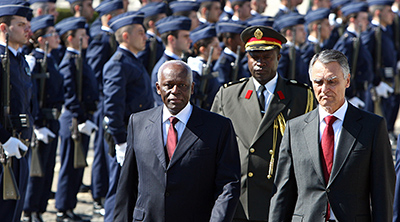Portuguese journalists are increasingly concerned by Angola’s growing investment and influence in their country. Buoyed by petrodollars and diamonds, powerful Angolan interests have been indulging in a buying spree in their former colonial power. Angolan capital invested in Portugal increased 35 times in the past decade, according to news reports. In a process often acidly described in Lisbon as a form of “reverse colonization,” Angolans have gobbled up not only significant chunks of Portugal’s banking, telecommunications, and energy companies, but also invested in the Portuguese media sector.
One source of concern is the Newshold media group, a company owned by Pineview Overseas, a Panama-based offshore company, whose shareholders are powerful Angolan figures including tycoon Alvaro Sobrinho. Newshold controls Sol, Portugal’s third largest weekly, and owns stakes in two leading magazines, Visâo and Expresso, as well as Correio da Manhâ, the largest-circulation Lisbon tabloid, and the business paper Jornal de Negocios. It has also expressed interest in case the Portuguese government eventually decides to privatize the public service broadcaster RTP (Radio e Televisâo Portuguesa).
Many Angolan investors are known to be closely linked to Angola’s presidential entourage and the MPLA (People’s Movement for the Liberation of Angola), which has ruled the country without interruption since independence in 1975. Isabel dos Santos, the daughter of Angolan President José Eduardo dos Santos, is the top investor in the Portuguese telecommunications and multimedia company ZON.
These investments would likely raise fewer objections if Angola were a beacon of press freedom. In fact, Angola is one of Africa’s worst offenders on freedom of expression. Its media are strictly controlled by the ruling party, and independent journalists are regularly harassed. Ten journalists have been killed for their work, with absolute impunity, since CPJ began keeping records in 1992.
Aware of their economic fragility, authorities in Lisbon are wary of upsetting their powerful economic partner, local journalists say. “Angola has become a taboo subject in Portugal,” Raquael Freire told the French daily Libération last week. Freire was until early last year a columnist for Antena 1, a radio channel of public broadcaster RTP. Her program, “Este Tempo,” was canceled after one of her colleagues, internationally acclaimed writer Pedro Rosa Mendes, lambasted the RTP for having helped the Portuguese government portray the Angolan regime in a flattering light.
“The bottom of the matter,” Nicolau Santos, deputy editor of the weekly Expresso, told Libération, “is that Luanda’s authorities do not accept that the Portuguese media write articles that do not please them. We do not have the same concept of freedom of expression.”
The concern over Angola’s intrusion comes at a time of great economic uncertainty in Portugal, where the eurozone crisis has led to a financial bailout conditioned on deep budgetary cuts. In the context of these harsh austerity measures, the media have taken a battering, leaving them potentially more vulnerable to outside pressures. “This time of profound crisis is when we need more that the media are enabled to do their work in the best conditions,” Sofia Lorena, of the quality daily Publico, told Deutsche Welle. “What we have is exactly the opposite. Every newspaper in Portugal this year has lost dozens of people.”
“Cash-strapped media, at least some of them, think that they can be saved by Angolan money,” Rui Tavares, Portuguese Member of the European Parliament representing the Green party, told CPJ. “They have therefore an interest in keeping good relations with Angola, which leads to self-censorship,” added Tavares, who is the European Parliament’s rapporteur on press freedom in Hungary.
“The fact that Portuguese authorities are on their knees (before Angola’s rulers) does not help,” adds Expresso deputy editor Santos. However, if the Portuguese government of Prime Minister Pedro Passos Coelho appears ready to kowtow to Luanda’s rulers, others wave the flag of resistance. In recent months, Expresso has published a series of stories exposing the corruption of powerful Angolan governmental and military figures, triggering the immediate retaliation of the official Angolan media, which have accused Portuguese “elites” of hating Angola.
And in February, Portuguese prosecutors threw out a criminal defamation suit by nine Angolan generals against Angolan writer Rafael Marques de Morais and his Portuguese publisher, Tinta-de-China, for the book Diamantes de Sangre: Tortura e Corrupçâo em Angola (Blood Diamonds: Torture and Corruption in Angola). The complainants are pursuing the case in a civil court, where they are asking for 300,000 euros (US$387,000) in punitive damages for libel and defamation.
“The Portuguese media is under major stress to stem the reporting of negative news on Angola. The main reason is that the Portuguese media has greater impact in Angola, where the state has a grip on the mainstream media,” Marques told CPJ. “But it also serves the interests of the ruling elites in Portugal, for they can use some of the African attitude to their own internal political advantage. All is billed under the national interest of saving the Portuguese economy by allowing all sorts of shady Angolan investments.”
The Portuguese media quandary is being followed closely in Brussels, where press freedom and media pluralism have become increasing concerns across the whole EU. MEP Tavares said he expects the European Parliament to soon discuss a resolution on the impact of the economic crisis on freedom of the press in Europe. Portugal will stand out as an emblem of a worrying drift.
